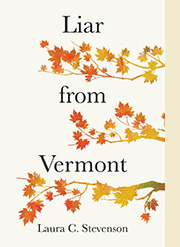A New Series: One Minute Reviews of
Books by Vermont Authors
Laura's column "One Minute Reviews" has appeared bi-weekly in Wilmington, Vermont's Deerfield Valley News since 2015. In April 2018, she found that no Vermont periodical consistently reviews all commercially published fiction and non-fiction by Vermont authors, so she started a series to fill that void. Published reviews from that series and some earlier reviews of local authors are listed with links to a scan of the printed copy. Reviews still in queue are listed without links until they appear in print.
The books reviewed in this series are available through Wilmington's Pettee Memorial Library, the Whitingham Free Public Library, and locally owned Bartleby's Books in Wilmington.
Deerfield Valley News, 4/8/2021
Sports Fandom Considered
Larry Olmsted, Fans: How Watching Sports Makes Us Happier, Healthier, And More Understanding. Algonquin Books, 2021
Sports fans, according to Larry Olmsted, "have been dissed." Think about football fans, hockey fans, basketball fans: regardless of the sport, the picture in your mind may well be one of overweight people watching The Big Game on TV, munching junk food and drinking beer. Even a more charitable portrayal of fandom often dismisses it as a way of wasting time on something that doesn't really matter. These negative portrayals, familiar in ads and sitcoms, completely miss the value of sport fandom, according to Olmsted, and he has written a book that proves its value. He sets it on two days of skiing and conversation at Jackson Hole with "Dr. Kristie," a renamed athletic friend who skis, bikes, runs, climbs—and considers following sports a waste of time. The frame allows for questions and arguments as well as a lecture on the happiness fandom brings to people around the world.
Olmsted's argument, based on interviews with fans and with psychologists of impressive academic credentials, is basically that identification with a sports team gives people a common interest and with that, a kind of security that improves social and psychological health. Sports fans, he asserts, have superior linguistic skills; college students loyal to their team have higher GPAs, better graduation rates, and, on the far side of college, better and higher paying jobs than their fellows. One may well be skeptical (the few sports fans I knew at the University of Michigan were far from the heads of their classes), but after a few chapters, Olmsted gets into more interesting and better-supported ideas. Watching sports, he says, creates unity in times of terrible political stress. For example, in 1968, the Detroit Tigers won the World Series—the year after the race riots of 1967 had left the city in shambles. The team's path to victory, according to many people in Detroit, encouraged them to unite in supporting a common goal, and while it didn't heal the city's wounds, it provided a "tourniquet that greatly helped control profuse bleeding." On a smaller scale, Olmsted tells the story of kids at the Iowa Stead Family Children's Hospital, many there for long stays, who became inspired and encouraged as they watched Hawkeye games—and overwhelmed with delight as they witnessed the players and the 68,000 fans in the stadium below them stand up and wave to them. As one father said, it took them temporarily out of their hospital lives and gave them hope and connection with the people cheering for them.
Arguing that sports (and their fans) "make the world a better place," Olmsted depicts the political outcome of their enthusiastic support. Jackie Robinson, for example, "could be seen as the inauguration of the modern civil rights movement," opening the door for Martin Luther King, and, at a greater remove, the presidency of Barack Obama. Outside of politics, the desegregation of Major League Baseball was a tremendously important breakthrough in sports, and Robinson's "profile in courage" also encouraged other men and women whose athletic prowess would have remained unknown because of discrimination: Joe Louis, Joe DiMaggio, Billie Jean King and others. There are, of course, down-sides to sports fandom: tribalism, as Olmsted puts it, and sometimes violence. He fully admits that we need to do better. In general, however, he makes a good, if overly repetitive and somewhat flat, case for sports fans, and sports enthusiasts who read this book will find it entertaining and enjoyable.


